Related Research Articles

Latvia, officially known as the Republic of Latvia, is a country in the Baltic region of Northern Europe. Since Latvia's independence in 1918, it has been referred to as one of the Baltic states. It is bordered by Estonia to the north, Lithuania to the south, Russia to the east, Belarus to the southeast, and shares a maritime border with Sweden to the west. Latvia has 1,957,200 inhabitants and a territory of 64,589 km2 (24,938 sq mi). Its capital and largest city is Riga; other notable major cities in Latvia are Daugavpils, Liepāja, Jelgava and Jūrmala. The country has a temperate seasonal climate. The Baltic Sea moderates the climate, although the country has four distinct seasons and snowy winters.

The history of Latvia began around 9000 BC with the end of the last glacial period in northern Europe. Ancient Baltic peoples arrived in the area during the second millennium BC, and four distinct tribal realms in Latvia's territory were identifiable towards the end of the first millennium AD. Latvia's principal river Daugava, was at the head of an important trade route from the Baltic region through Russia into southern Europe and the Middle East that was used by the Vikings and later Nordic and German traders.

Riga is the capital of Latvia and is home to 627,487 inhabitants (2020), which is a third of Latvia's population. Being significantly larger than other cities of Latvia, Riga is the country's primate city. It is also the largest city in the three Baltic states and is home to one tenth of the three Baltic states' combined population. The city lies on the Gulf of Riga at the mouth of the Daugava river where it meets the Baltic Sea. Riga's territory covers 307.17 km2 (118.60 sq mi) and lies 1–10 m above sea level, on a flat and sandy plain.
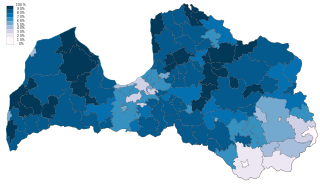
Latvian, also known as Lettish, is an Eastern Baltic language spoken in the Baltic region. It is the language of Latvians and the official language of Latvia as well as one of the official languages of the European Union. There are about 1.3 million native Latvian speakers in Latvia and 100,000 abroad. Altogether, 2 million, or 80% of the population of Latvia, speak Latvian. Of those, around 1.16 million or 62% used it as their primary language at home.
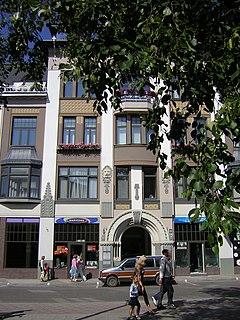
Liepāja is a city in western Latvia, located on the Baltic Sea. It is the largest city in the Kurzeme Region and the third largest city in the country after Riga and Daugavpils. It is an important ice-free port. In 2019 the population of Liepāja was 68,945 people.

The Baltic states, also known as the Baltic countries, Baltic republics, Baltic nations, or simply the Baltics, is a geopolitical term, typically used to group the three sovereign states in Northern Europe on the eastern coast of the Baltic Sea: Estonia, Latvia, and Lithuania. The term is not used in the context of cultural areas, national identity, or language, because while the majority of people in Latvia and Lithuania are Baltic people, the majority in Estonia are Finnic. The three countries do not form an official union, but engage in intergovernmental and parliamentary cooperation. The most important areas of cooperation among the three countries are foreign and security policy, defence, energy, and transportation.

The Singing Revolution is a commonly used name for events that led to the restoration of independence of the Baltic states of Estonia, Latvia, and Lithuania from the Soviet Union at the end of the Cold War. The term was coined by an Estonian activist and artist, Heinz Valk, in an article published a week after 10–11 June 1988, spontaneous mass evening singing demonstrations at the Tallinn Song Festival Grounds.
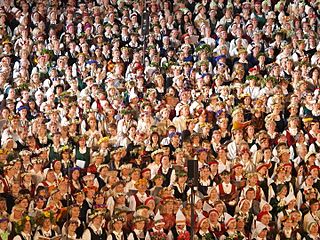
Latvians are a Baltic ethnic group and nation native to Latvia and the immediate geographical region, the Baltics. They are occasionally also referred to as Letts, although this term is becoming obsolete. Latvians share a common Latvian language, culture and history.
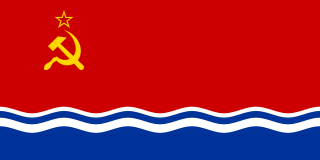
The Latvian Soviet Socialist Republic, also known as Soviet Latvia or Latvia, was a republic of the Soviet Union.

Ventspils is a city in northwestern Latvia in the historical Courland region of Latvia, and is the sixth largest city in the country. At the beginning of 2019, Ventspils had a population of 34,377. It is situated on the Venta River and the Baltic Sea, and has an ice-free port. The city's name literally means "castle on the Venta", referring to the Livonian Order's castle built alongside the Venta River. Ventspils holds the national record for the highest temperature ever recorded in Latvia with 37.8 °C (100.0 °F) on 4 August 2014.

The University of Latvia (LU) is a state-run university located in Riga, Latvia. It was established in 1919.

The Latvian Russian Union (LKS) is a political party in Latvia supported mainly by ethnic Russians and other Russian-speaking minorities. The co-chairpersons of the Latvian Russian Union are Miroslav Mitrofanov and Tatjana Ždanoka.

Jelgava is a city in central Latvia about 41 kilometres southwest of Riga with 55,972 inhabitants (2019). It is the largest town in the region of Zemgale (Semigalia). Jelgava was the capital of the united Duchy of Courland and Semigallia (1578–1795) and the administrative center of the Courland Governorate (1795–1918).
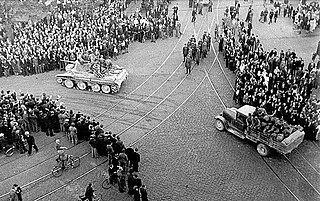
The Soviet occupation of Latvia in 1940 refers to the military occupation of the Republic of Latvia by the Soviet Union under the provisions of the 1939 Molotov–Ribbentrop Pact with Nazi Germany and its Secret Additional Protocol signed in August 1939. The occupation took place according to the European Court of Human Rights, the Government of Latvia, the United States Department of State, and the European Union. In 1989, the USSR also condemned the 1939 secret protocol between Nazi Germany and herself that had led to the invasion and occupation of the three Baltic countries, including Latvia.

The National Library of Latvia, also known as Castle of Light, is a national cultural institution under the supervision of the Ministry of Culture of Latvia. The National Library of Latvia was formed in 1919 after the independent Republic of Latvia was proclaimed in 1918. The first supervisor of the Library was Jānis Misiņš, a librarian and the founder of the Latvian scientific bibliography (1862–1945).
Latvia women's national football team represent Latvia in international football.
Latvian Riflemen Soviet Divisions were military formations of the Red Army during World War II created in 1941 and consisting primarily of ethnic Latvians.

Latvia competed at the 2014 Summer Youth Olympics, in Nanjing, China from 16 August to 28 August 2014.

Riga Football Club, commonly referred to as Riga FC, is a Latvian football club, founded in 2014. The club is based at the Skonto Stadium in Riga. Since 2016 the club has been playing in the Virslīga.
References
- ↑ Name Day Calendar: August Retrieved 10 December 2017.
| This page or section lists people that share the same given name. If an internal link led you here, you may wish to change that link to point directly to the intended article. |